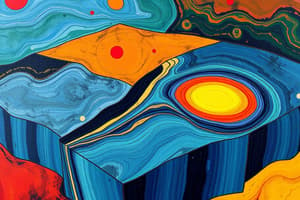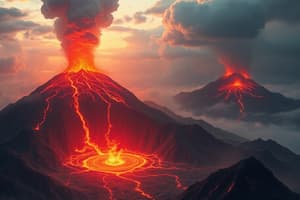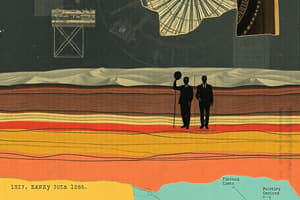Podcast
Questions and Answers
What describes the motion of Rayleigh waves during an earthquake?
What describes the motion of Rayleigh waves during an earthquake?
- They travel straight down into the earth.
- They spread out uniformly in all directions.
- They move in a zigzag pattern.
- They move in a rolling motion similar to ocean waves. (correct)
Which region is known for experiencing nearly 81% of earthquakes?
Which region is known for experiencing nearly 81% of earthquakes?
- The Mid-Atlantic Ridge
- The Appalachian Mountains
- The Himalayan region
- The circum-Pacific Belt (Ring of Fire) (correct)
What significant environmental agreement aimed to ban the use of CFCs?
What significant environmental agreement aimed to ban the use of CFCs?
- Earth Hour Initiative
- Montreal Protocol (correct)
- Kyoto Protocol
- Paris Agreement
Who is credited with determining the circumference of the Earth using the angle of sunlight?
Who is credited with determining the circumference of the Earth using the angle of sunlight?
What type of materials are classified as not being minerals?
What type of materials are classified as not being minerals?
What is the shortest day of the year referred to as?
What is the shortest day of the year referred to as?
What belief places the Earth at the center of the universe?
What belief places the Earth at the center of the universe?
What scientific development is Hipparchus known for?
What scientific development is Hipparchus known for?
What significant development occurred during the Archean Eon?
What significant development occurred during the Archean Eon?
Which period is known as the 'Age of Invertebrates'?
Which period is known as the 'Age of Invertebrates'?
During which period did the first flowering plants emerge?
During which period did the first flowering plants emerge?
What major event happened towards the end of the Permian Period?
What major event happened towards the end of the Permian Period?
What major evolutionary development occurred during the Devonian Period?
What major evolutionary development occurred during the Devonian Period?
Which period is marked by the emergence of modern mammals and birds?
Which period is marked by the emergence of modern mammals and birds?
What is a defining characteristic of the Hadean Eon?
What is a defining characteristic of the Hadean Eon?
What type of tectonic wave is characterized by horizontal and vertical shaking in an S-like pattern?
What type of tectonic wave is characterized by horizontal and vertical shaking in an S-like pattern?
Flashcards are hidden until you start studying
Study Notes
Eons of Earth History
- Archean Eon: Prokaryotic bacteria emerged; blue-green algae began oxygen production.
- Hadean Eon: Formation of Earth occurred with a magma ocean and intense bombardment from space bodies.
- Proterozoic Eon: Introduction of multicellular life forms.
Major Geological Time Periods
- Cambrian Period: Rapid diversification and flourishing of multicellular organisms.
- Ordovician Period: Known as the "Age of Invertebrates."
- Silurian Period: First appearance of terrestrial plants.
- Devonian Period: Referred to as the "Age of Fishes"; first true amphibians evolved toward the end.
- Carboniferous Period: Dominance of amphibians in ecosystems.
- Pennsylvanian Subperiod: Emergence of reptiles as a prominent group.
- Mississippian Subperiod: Notable amphibian diversification and formation of extensive coal swamps.
- Triassic Period: Birth of dinosaurs and the Age of Reptiles; appearance of the first true mammals, therapsids.
- Jurassic Period: Dinosaurs became the dominant terrestrial vertebrates; first birds made their appearance.
- Permian Period: Characterized by Pangaea's existence; culminated in the largest mass extinction event.
- Cretaceous Period: First flowering plants (angiosperms) emerged; ended the Age of Reptiles with the Cretaceous-Tertiary Extinction (K-T event).
- Paleogene Period: Initiation of the Age of Mammals.
- Neogene Period: Evolution of mammals and birds into modern forms; early hominids appeared near the end.
- Quaternary Period: Current geological period defined by cycles of glacial and interglacial stages.
Plate Tectonics
- Major tectonic plates include: African, Antarctic, Eurasian, Indo-Australian, North American, Pacific, and South American plates.
- The lithosphere is segmented into rigid slabs known as tectonic plates.
Earthquake Dynamics
- Love Waves produce horizontal and vertical shaking; Rayleigh Waves create a rolling motion akin to ocean waves.
- Approximately 81% of earthquakes occur in the circum-Pacific Belt, also known as the Ring of Fire.
- Thousands of earthquakes happen daily, most of which are too minor to be perceived.
Environmental Concerns
- Hazardous chemical spills from factories present significant environmental threats.
- The Montreal Protocol, initiated by the United Nations in 1987, aimed to ban CFC production and usage.
Astronomy Insights
- The winter solstice marks the shortest day of the year.
- Minerals are defined as substances with an ordered crystalline structure; examples like obsidian and plastic do not qualify.
- Historical figures such as Aristotle provided scientific evidence of Earth’s spherical shape based on eclipse shadows.
- The golden age of astronomy saw the development of geometry and trigonometry by early Greek astronomers to analyze celestial bodies.
- The geocentric model positions Earth at the universe's center, while Aristarchus proposed the heliocentric view.
- Parmenides was the first to suggest that Earth is spherical, while Eratosthenes calculated Earth's circumference based on solar angles.
- Hipparchus made significant contributions to astronomy, including advancements in trigonometry, lunar distance estimation, and compiling a star catalog of over 850 stars.
- Claudius Ptolemy formulated a geocentric system that accounted for the apparent motion of celestial bodies.
Studying That Suits You
Use AI to generate personalized quizzes and flashcards to suit your learning preferences.




